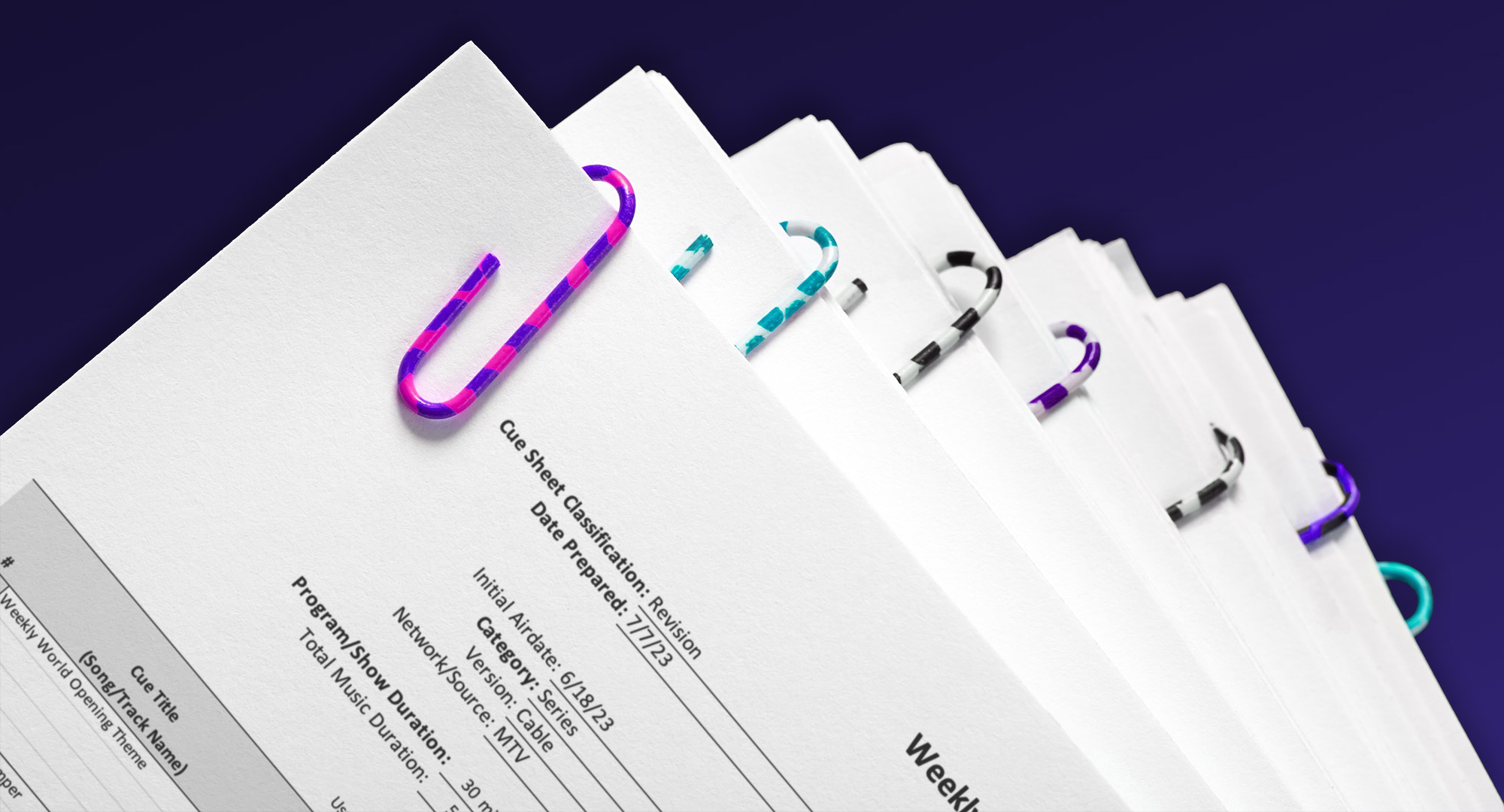The world of music licensing is broad and nuanced. But when utilized correctly, any talented musician can learn to navigate the licensing landscape and harness a steady stream of income for their music that streaming and performing live can’t always replicate.
A large part of the battle for getting your music licensed is choosing where you want your music to live in the global licensing economy. Putting in time and doing the research can yield successful results, but making rushed decisions to save time can lower the value of your music and make it incredibly difficult to land a licensing placement.
1. Know what you’re signing up for
Having an experienced entertainment attorney can help identify favorable and unfavorable deals and ensure that you have steady and fair revenue streaming coming your way. But not everyone has a lawyer in their back pocket. We can name one million reasons for reading each agreement before signing, and they all lead to the same point in the end: read the contract.
Were you expecting to be signed to an exclusive agreement? Were you expecting a different royalty split? Were you expecting advances? These questions should all be answered before signing an agreement.
There are hundreds of music licensing companies that run different models. Each company has different deal points that may be more or less favorable than another company occupying the same space.
TREAT YOUR ART LIKE A BUSINESS
2. Choose in your best interests
What are you expecting out of your deal? It’s important to be realistic about your goals and treat your art like a business.
- Are you a younger musician in the space and want your music visible to everyone online to be licensed? Libraries are a great place to start.
- Or are you a seasoned musician with a catalog of ready-to-license music and industry contacts? Maybe it is time to start pitching some music to supervisors and producers.
- Are you between seasoned and beginner and need help kickstarting your licensing career? A music sync representative can help you build that base.
There are many, many reputable companies ready to license your music for you but it’s important to learn the distinction between a library and a sync rep.
Music Libraries
Music libraries provide excellent tools for artists to connect their music to a global marketplace. Podcasters, YouTubers, indie filmmakers, and local businesses rely on library music to provide an inexpensive and simple solution to licensing music for their work. Music libraries are excellent places for producers and composers to release music. If you’re a solo artist working on advancing your career, music libraries might not be for you. But, if you’re a songwriter that wants to exploit your natural musicality to create sync-friendly music, a music library might be an excellent place to showcase unused ideas for music that didn’t quite make the cut for your solo music.
Know your worth. Licensing your music creates a bridge between being a starving artist and turning your art into a business. However, avoid selling yourself, and your art, short. Like everything else in the business world, you will run into discount services that will drive the cost of your product down. These discount libraries can pay mere dollars for tracks, but could be an excellent option for newer content creators. However, nobody makes a fortune off of their music in these libraries. A couple hundred licenses in the discount libraries will add up to one significant placement in a more premium library that caters to bigger productions.
Sync Representation Agents
Sync Representation Agents are excellent people to reach out to when your music is sync ready, but you’re unsure of the sync licensing process. Music supervisors rarely sign deals directly with artists because of the hurdles associated with inexperience in the business. If you are familiar with the “sync business,” you know that there are many companies that exist with the sole purpose of representing artists for sync placement. These companies are significantly more selective than libraries and will personally shop your music around. Sync rep agents will make sure all your details are in order for the smoothest and quickest transition for a placement. They ensure that everything is properly cleared, metadata is in order, and, most importantly, they pitch the right projects to the right people.
Make sure they know your worth. There is quite a bit of debate between whether exclusive or non-exclusive licensing deals are best, and to be honest, it’s quite subjective. The general argument is that without an exclusive deal, your pitching agent may not proceed with the same amount of motivation as one of their exclusive clients. But in that same regard, if you are signed to an exclusive deal with a bad agent that isn’t landing you many (or any) placements, you’re stuck for the duration of that contract. These deals are all about leverage. If you want your music to be paid attention to, it’s important to consider whether you’re musically at the level to demand that kind of attention. If you are, then don’t settle. Shoot for that agent that will get you that deal. If you’re new to the scene, maybe take a step back, evaluate your position, and look for the deal to best put you in a comfortable position without locking yourself into an unrealistic contract.
HAVE ALL THE NECESSARY DETAILS IN LINE PRIOR TO SUBMITTING
DIY Sync Pitching
DIY Sync pitching can be an incredibly successful experience… or it could be a huge waste of time. Many artists operate on a “figure it out as we go” type of mentality, but there is a lot more than just luck and talent on this side of the business. Preparation and organization is key. The turnaround time for sync placements can be secured in less than 24 hours and the only way you’re turning a deal around in that amount of time is if you have all the necessary details in line prior to submitting your material for a placement.
Make sure you prove your worth. Pitching to a music supervisor does not mean send them a zip file of your music and hope they figure something out with it. If it was that easy, everyone would do it. Do your research and know exactly what you’re submitting music for. Are you pitching for TV? Commercials perhaps? The next blockbuster film?
Know what type of programming you’re submitting to. Are you a metal artist? Well if so, it might be a good idea to look at the placements that the music supervisor has landed. It won’t do you a ton of good to pitch to a supervisor that primarily works with PBS programs.
After you do research, do more research. Find the soundtracks of the programs you can pitch to with sites like Tunefind.com. For searching out individual brands to see what they tend to use in their commercials, Ispot.tv has a wealth of information ALL about music and advertising. Look up entire music departments on IMDB.com. You can connect with supervisors on LinkedIn and personally ask them what they prefer. There are all different resources for your to find the information that you need.
3. Submitting your material
Once you’re ready to submit, present everything in a clean and professional manner. Unsolicited demos are no one’s favorite thing—especially in the form of a disorganized zip file on Google Drive. File management can be a bit of a nightmare after receiving many submissions. Furthermore, as an artist, sending out submissions can be stressful and you may often get ignored or have no way of knowing who took the time to listen to your submission. Whether you’re submitting to a library, a sync rep, or directly to a supervisor, organization is key, and ReelCrafter is an excellent way to send organized pitches to the right people.
- Detailed metrics on listening activity. Unlike any other platform, ReelCrafter provides incredibly detailed metrics. Our Pro plan users see real-time tracking for every single open, play, seek and skip on each reel. Insights like these are invaluable. Know exactly when to follow up on a lead, which tracks are consistently listened to (or skipped), or see if your reel was never opened.
- High-quality audio streaming. Unlike a lot of other streaming music services, ReelCrafter will transcode your original uncompressed audio files to 256Kbps AAC for exceptional quality. Not only will your reel look amazing, it will sound amazing, too!
- Distraction-free listening experience. Our reels put your work front and center—your curated playlist, your own logo, your project imagery, and even your video content. When a listener opens their personal (and very mobile-friendly) link, there will be nothing on the page to distract them. No followers, comments, or artist search options.
- Password protection and download options. Adding a password to your ReelCrafter reels lets you send it with an extra layer of security so that you do not have to post a track publicly. No more messing around with emailing links to cloud storage or building “secret” pages on your website for private access. Plus, setting a reel as downloadable gives you even more control of the listening experience.
- Build on the fly with non-destructive snippets. There’s nothing worse than being outside of your studio and getting an urgent request for a specific type of reel. Once you’ve uploaded your catalog to ReelCrafter, each audio track will be available in the app for reel building. Our non-destructive snippet editor means you won’t have to open your waveform editing software to chop up tracks and highlight certain sections. You can build the perfect reel, with custom snippets, from just about any computer with an internet connection.
Check out the rest of our music licensing series:
How sync licensing works
4 things composers can do to get paid what they’re owed
Everything you need to know about cue sheets and music royalties




